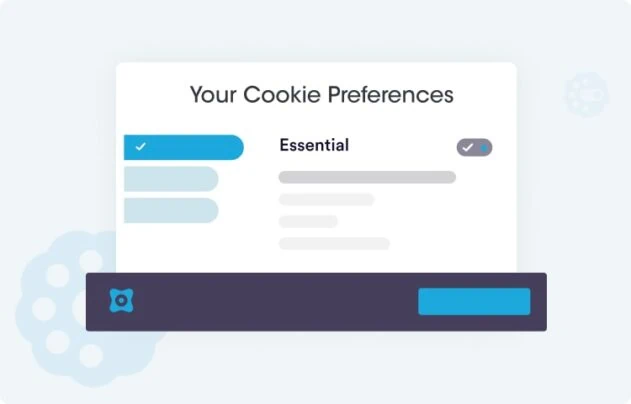What is User Consent?
User consent is a fairly straightforward concept. At its core, user consent is the permission granted by users to a website or organization to proceed with their data collection. A user’s consent is primarily used for advertising and marketing purposes. Of course, different countries have their own legislations and interpretations of what constitutes a valid ‘user consent’ and how it can be obtained.
One of the ways to obtain the user’s consent is via a cookie consent banner. The exact cookie banner text may differ, its position or design might also differ depending on the applicable privacy law, but the purpose remains the same i.e., to inform website users of the use of cookies on the website or collect their consent for marketing purposes.
Data protection laws such as the CPRA, the GDPR, and LGPD have their own requirements to obtain user consent online for the use of cookies and marketing purposes.
Why Is It Important?
So why is user consent of such importance exactly? A few years ago, specifically, the time before the GDPR came into effect, that question may have been more of a moral and ethical one. However, with user consent now a central part of nearly every major data protection law, it is crucial to understand what makes it so important now?
Transparency
Transparency is the first major reason why user consent is so important now. Not so long ago, businesses could have unlimited access to data. One can argue this wasn't such a bad deal considering unrestricted access to this data allowed businesses to create a personalized browsing experience for users that may have seen impossible.
Websites could target users based on what brand of smartphones they were using, their phones' screen size, the operating system on their computers, their language, and of course, what time of the day they were browsing the net. All of that ensured better chances of ads being converted into purchases.
However, now, a website must be absolutely straightforward and forthcoming about exactly what data they collect, what mechanisms they use to collect data, what they do with the data once it’s collected, and most importantly, what rights do users have on their data once it is collected.
No Trade Offs
However, it was not uncommon for users that did not allow websites to have this access (consent to cookie tracking), would have a diminished user experience.
Think of having to log in each time you refresh your Facebook feed or your shopping cart being empty each time you move to a different page on Amazon.
As a result, the prospect of an inferior browsing experience was enough for users to accept cookie tracking. However, users must now be guaranteed an equal if not a better browsing experience on a site even if they reject all cookies, barring the ones necessary for basic functions.
Users’ Trust
There was a time when gaining users’ trust meant providing them with what they asked for—in other words, fulfilling the old market mantra of the best product/service having an easier time cementing its reliability.
While that may still hold true, other factors now rank just as highly when gaining users’ trust. How a website deals with user consent is one such factor. For an educated user in 2022, a website that does not give them a reasonable chance to choose what data they wish to share or which information they would not like to be shared with third parties does not warrant their trust.
Giving the Users Greater Control
This is arguably the most visible way in which the elevated importance of user consent has impacted websites. It allows users to curate and, in many ways, customize the kind of browsing experience they want to have and how much data they’re willing to share to achieve it.
User consent guarantees that users are made explicitly aware of what data a website plans to collect on them, why, whether it plans to share/sell this data to a third party, and how long it will store this data. Users can then make an informed decision related to what degree of access they want websites to have over their data.
Types of Consent
By now, it should be clear that while it is a relatively easy concept to understand, its interpretations can be wildly different depending on the law and the country in question. However, as far as the types of consent are concerned, most privacy laws deal with two distinct categories; Implicit & Explicit Consent.
Implicit Consent - Implicit Consent is when a business or a website assumes a user has or would have given consent, if asked, based on their behavior online. A typical example is if a customer makes regular purchases from an online store, the store has a reasonable cause to believe that the user consents to receive marketing emails.
Explicit Consent - Explicit Consent is when a user grants the permissions related to data collection being requested of their own free will and accord. The GDPR is an excellent example of explicit consent, explaining it as "any freely given, specific, informed and unambiguous [...] clear affirmative action".
How Can Securiti Help?
Data compliance has become both a legal and strategic requirement for organizations globally. With an increasing number of countries either having enforced data protection laws or in the process of doing so, organizations must take a proactive approach in ensuring they comply with the provisions set out in each of these laws.
Of course, that is easier said than done, considering just how varied the requirements and obligations for organizations are in each of these laws. That's where automation comes in as by far the most effective way to ensure compliance.
Securiti is an industry leader in providing enterprise solutions in data compliance and data governance. With solutions ranging from consent management to robotic DSR automation and breach management, Securiti can help you tailor your business practices to comply with every major data protection law.
Request a demo today to see numerous other Securiti products.












